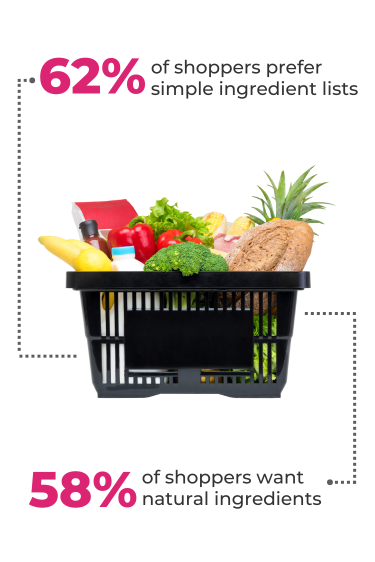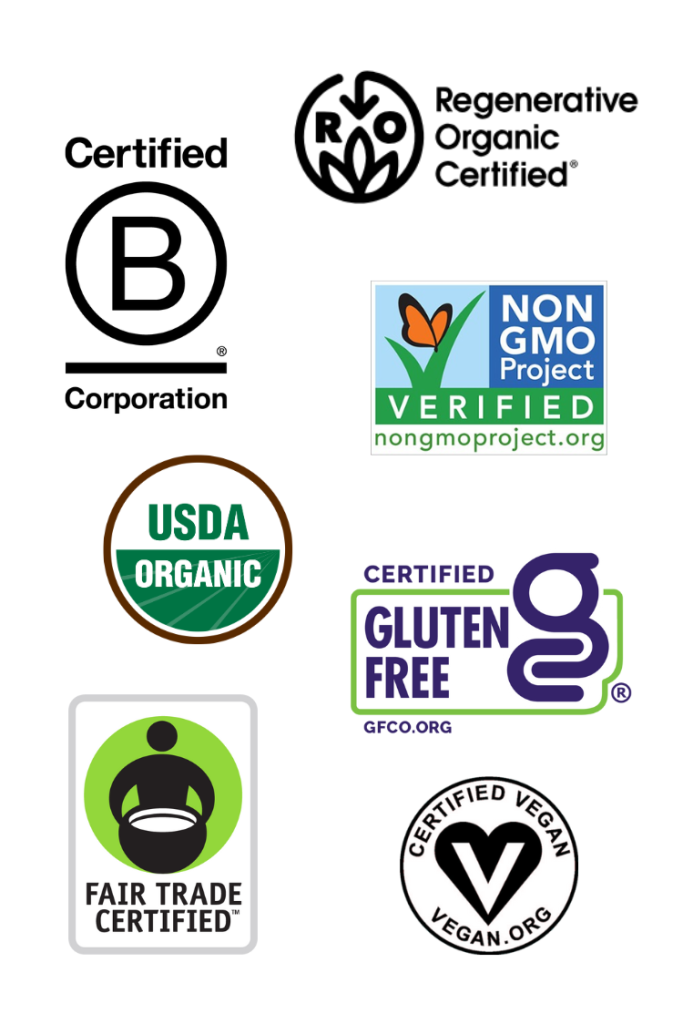Today’s shoppers are paying closer attention to the products they buy. They’re researching ingredients, scanning labels, and making choices that align with their values. In fact, 69% of consumers believe there should be stricter guidelines for food and beverage labeling at grocery stores. As a result, certifications have become a key tool for natural brands to demonstrate transparency, build trust, and ultimately drive sales.
Third-party validation offers a powerful way to confirm a brand’s claims, whether it’s about using non-GMO ingredients, following ethical sourcing practices, or meeting organic standards. These seals of approval help consumers make informed choices and signal that a brand is committed to quality.
Table of Contents
-
- Why Certifications Resonate with Today’s Shoppers
- Building Trust Through Transparency
- Top Certifications to Consider for Natural Brands
- How Certifications Can Drive Sales and Open New Doors
- Certifications as a Competitive Advantage
- Tips for Certification Success
- Final Thoughts: Certifications as a Path to Growth
A recent Social Nature study found that 62% of consumers prefer simple ingredient lists, and 58% seek natural ingredients. As they strive to align their purchases with their values, they’re looking for cues that make it easier to choose products they can trust. Certifications provide that clarity by offering visible, reliable indicators that a product meets certain standards.
For many brands, securing these seals isn’t just about compliance – it’s a way to strengthen connections with their shoppers. By aligning with trusted standards that reflect their audience’s values, brands make it easier for shoppers to feel confident about their choices without spending extra time deciphering labels or analyzing complex ingredient lists.

Trust plays a critical role in purchasing decisions, especially when it comes to food and personal care products. 59% of consumers check nutrition labels before buying a product, and they’re more likely to choose brands that demonstrate transparency. Labels like Non-GMO Project Verified, USDA Organic, and Fair Trade Certified reinforce that trust by signaling that a brand has met established guidelines, whether through sustainable farming practices, ethical labor standards, or clean ingredient sourcing.
If you’re a natural brand looking to build trust and stand out in a competitive market, pursuing the right certifications can make a significant impact. Here’s a look at of some of the most common verifications for brands in the food, beverage, and personal care sectors:
- Non-GMO Project Verified – Ensures that a product is free from genetically modified organisms (GMOs), appealing to the growing number of consumers seeking clean, high-quality products.
- USDA Organic – Guarantees that a product meets strict organic farming and processing standards. With U.S. organic sales exceeding $60 billion in 2023, demand for organic products is only growing.
- Regenerative Organic Certified – Going beyond organic, this ensures products are sourced from farms that prioritize soil health, animal welfare, and social fairness.
- Certified Vegan – Verifies that a product contains no animal ingredients or by-products, catering to ethically conscious consumers seeking plant-based options.
- Fair Trade Certified – Ensures products are produced under fair economic, social and environmental standards, adding credibility for brands focused on ethical sourcing.
- Gluten-Free Certification – Assures consumers that a product meets strict gluten-free standards, essential for individuals with celiac disease or gluten sensitivity.
- B Corp Certification – Evaluates a company’s overall social and environmental performance, demonstrating a broader commitment to positive impact beyond individual products.

Earning the right label not only builds trust but can also boost sales and improve a brand’s standing with retailers. Many grocery stores, particularly those focused on natural and organic products, often prefer or require certain certifications as part of their product selection process. Securing these certifications can help brands stand out and meet the growing expectations of both shoppers and retail buyers.
Hans Eisenbeis from the Non-GMO Project highlighted that today’s shoppers expect to find natural and better-for-you products wherever they shop. As retailers work to meet these expectations, they increasingly look for brands that carry trusted certifications. Securing these labels not only signals a brand’s commitment to quality and transparency but can also open doors to new retail partnerships.
"The thing is, natural shoppers are kind of expecting to find natural products wherever they shop. And they do shop very eclectically - whether it's gas stations, dollar stores, their local co-op, and the occasional trip to Costco."
In a crowded market, standing out is a challenge. Certifications can be a powerful differentiator that signals quality and transparency. 56% of consumers say product quality is the biggest factor when determining if a product offers good value at the grocery store. Certified products reinforce that perception and position brands as leaders in their category.
Beyond serving as quality markers, these labels allow brands to tell a compelling story. Highlighting ethical sourcing through Fair Trade or emphasizing a commitment to sustainability with B Corp status gives consumers a reason to connect with the brand on a deeper level. These stories resonate with today’s values-driven shoppers and provide an opportunity to build loyalty over time.
If you’re considering adding certifications to your product portfolio, here are a few practical tips:
- Choose certifications that align with your brand values. Focus on certifications that resonate with your mission and target audience.
- Understand the requirements. Each certification has its own guidelines and processes. Take time to understand what’s involved before starting the process.
- Leverage certifications in your marketing. Once certified, highlight these credentials across your packaging, website, and marketing materials to maximize their impact.
- Educate your audience. Certifications provide an opportunity to engage and educate consumers about what makes your product unique. Use them to reinforce your brand story and values.

Becoming certified is more just than a compliance measure for natural brands. It acts as a pathway to increased trust, growth and deeper consumer engagement. As shopper expectations continue to rise, brands that invest in certifications can gain a competitive edge while aligning with the values that matter most to their shoppers.
Watch our webinar, How Natural Brands Win with Product Certifications, for more insights on why certifications are a great investment for natural brands.





